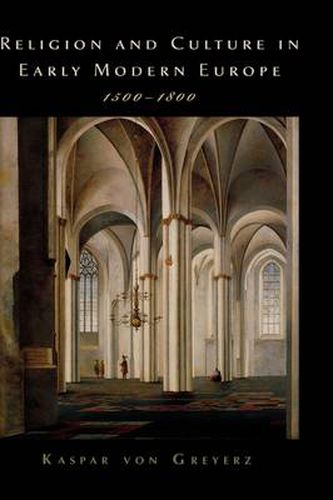Readings Newsletter
Become a Readings Member to make your shopping experience even easier.
Sign in or sign up for free!
You’re not far away from qualifying for FREE standard shipping within Australia
You’ve qualified for FREE standard shipping within Australia
The cart is loading…






This title is printed to order. This book may have been self-published. If so, we cannot guarantee the quality of the content. In the main most books will have gone through the editing process however some may not. We therefore suggest that you be aware of this before ordering this book. If in doubt check either the author or publisher’s details as we are unable to accept any returns unless they are faulty. Please contact us if you have any questions.
In the pre-industrial societies of early modern Europe, religion was a vessel of fundamental importance in making sense of personal and collective social, cultural and spiritual exercises. Developments from this era had immediate impact on these societies, much of which resonates to the present day. Published in German seven years ago, Kaspar von Greyerz important overview and interpretation of the religions and cultures of Early Modern Europe now appears in the English language for the first time. He approaches his subject matter with the concerns of a social anthropologist, rejecting the conventional dichotomy between popular and elite religion to focus instead on religion in its everyday cultural contexts. Concentrating primarily on Central and Western Europe, von Greyerz analyzes the dynamic strengths of early modern religion in three parts. First, he identifies the changes in religious life resulting from the Protestant Reformation and Catholic Counter-Reformation. He then reveals how the dynamic religious climate triggered various radical and separatist movements, such as the Anabaptists, puritans, and Quakers, and how the newfound emphasis on collective religious identity contributed to the marginalization of non-Christians and outsiders. Last, von Greyerz investigates the broad and still much divided field of research on secularization during the period covered.
While many large-scale historical approaches to early modern religion have concentrated on institutional aspects, this important study consciously neglects these elements to provide new and fascinating insights. The resulting work delves into the many distinguishing marks of the period: religious reform and renewal, the hotly debated issue of confessionalism , social inclusion and exclusion, and the increasing fragmentation of early modern religiosity in the context of the Enlightenment. In a final chapter, von Greyerz addresses the question as to whether early modern religion carried in itself the seeds of its own relativization.
$9.00 standard shipping within Australia
FREE standard shipping within Australia for orders over $100.00
Express & International shipping calculated at checkout
This title is printed to order. This book may have been self-published. If so, we cannot guarantee the quality of the content. In the main most books will have gone through the editing process however some may not. We therefore suggest that you be aware of this before ordering this book. If in doubt check either the author or publisher’s details as we are unable to accept any returns unless they are faulty. Please contact us if you have any questions.
In the pre-industrial societies of early modern Europe, religion was a vessel of fundamental importance in making sense of personal and collective social, cultural and spiritual exercises. Developments from this era had immediate impact on these societies, much of which resonates to the present day. Published in German seven years ago, Kaspar von Greyerz important overview and interpretation of the religions and cultures of Early Modern Europe now appears in the English language for the first time. He approaches his subject matter with the concerns of a social anthropologist, rejecting the conventional dichotomy between popular and elite religion to focus instead on religion in its everyday cultural contexts. Concentrating primarily on Central and Western Europe, von Greyerz analyzes the dynamic strengths of early modern religion in three parts. First, he identifies the changes in religious life resulting from the Protestant Reformation and Catholic Counter-Reformation. He then reveals how the dynamic religious climate triggered various radical and separatist movements, such as the Anabaptists, puritans, and Quakers, and how the newfound emphasis on collective religious identity contributed to the marginalization of non-Christians and outsiders. Last, von Greyerz investigates the broad and still much divided field of research on secularization during the period covered.
While many large-scale historical approaches to early modern religion have concentrated on institutional aspects, this important study consciously neglects these elements to provide new and fascinating insights. The resulting work delves into the many distinguishing marks of the period: religious reform and renewal, the hotly debated issue of confessionalism , social inclusion and exclusion, and the increasing fragmentation of early modern religiosity in the context of the Enlightenment. In a final chapter, von Greyerz addresses the question as to whether early modern religion carried in itself the seeds of its own relativization.